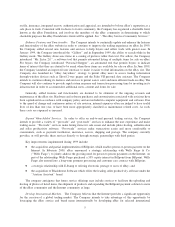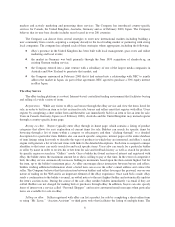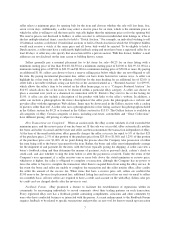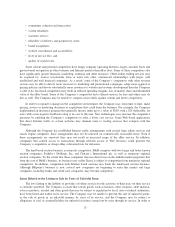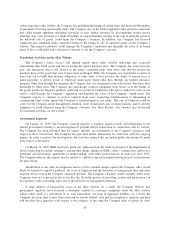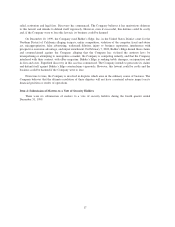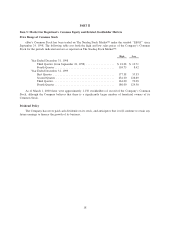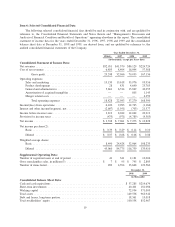eBay 1999 Annual Report Download - page 20
Download and view the complete annual report
Please find page 20 of the 1999 eBay annual report below. You can navigate through the pages in the report by either clicking on the pages listed below, or by using the keyword search tool below to find specific information within the annual report.from fraud. For example, the City of New York—Department of Consumer Affairs received complaints from
users about transactions on the eBay website. In investigating these complaints, the Department of Consumer
Affairs requested information about the Company and these transactions. The Company has provided the
requested information. The Company is likely to receive additional inquiries from regulatory agencies in the
future, which may lead to action against the Company. The Company has responded to all inquiries from
regulatory agencies by describing its current and planned antifraud efforts. If one or more of these agencies is
not satisfied with the Company’s response to current or future inquiries, the resultant investigations and potential
fines or other penalties could harm the Company’s business.
The Company has recently provided information to the antitrust division of the Department of Justice in
connection with an inquiry into the Company’s conduct with respect to ‘‘auction aggregators’’ including the
Company’s licensing program and its lawsuit against Bidder’s Edge. Should the antitrust division decide to take
action against the Company, the Company would likely be harmed by negative publicity, the costs of the action,
possible private antitrust lawsuits, the diversion of management time and effort and penalties the Company might
suffer if the Company ultimately were not to prevail. See ‘‘Risk Factors—Government inquiries may lead to
charges or penalties.’’
Privacy Policy
The Company believes that issues relating to privacy and the use of personal information relating to Internet
users are becoming increasingly important as the Internet and its commercial use grow. The Company has
adopted a detailed privacy policy that outlines how eBay uses information concerning its users and the extent to
which other registered eBay users may have access to this information. Users must acknowledge and agree to
this policy when registering for the eBay service. The Company does not sell or rent any personally identifiable
information about its users to any third party; however, the Company does disclose information to sellers and
winning bidders that contains the seller’s and winning bidder’s name, email address and telephone number. The
Company also discloses certain personally identifiable information to its subsidiaries and business partners in
connection with the provision of services by these entities. The Company also will disclose customer information
in its possession (other than credit card information) to a law enforcement agency or member of the Legal Buddy
Program that requests this information in connection with a civil, criminal or regulatory investigation. The
Company also uses information about its users for internal purposes in order to improve marketing and
promotional efforts, to analyze website usage statistically, and to improve content, product offerings and website
layout. eBay is a member of the TRUSTe program, a non-profit independent organization that audits websites’
privacy statements and audits their adherence thereto.
New and Existing Regulation of the Internet
The Company is subject to the same federal, state and local laws as other companies conducting business
on the Internet. Today there are relatively few laws specifically directed towards online services. However, due
to the increasing popularity and use of the Internet and online services, many laws relating to the Internet are
being debated at the state and federal levels and it is possible that laws and regulations will be adopted with
respect to the Internet or online services. These laws and regulations could cover issues such as online contracts,
user privacy, freedom of expression, pricing, fraud, content and quality of products and services, taxation,
advertising, intellectual property rights and information security. Applicability to the Internet of existing laws
governing issues such as property ownership, copyrights and other intellectual property issues, taxation, libel,
obscenity and personal privacy is uncertain. The vast majority of these laws were adopted prior to the advent of
the Internet and related technologies and, as a result, do not contemplate or address the unique issues of the
Internet and related technologies. Those laws that do reference the Internet, such as the recently passed Digital
Millennium Copyright Act, have not yet been interpreted by the courts and their applicability and reach are
therefore uncertain. In addition, numerous states, including the State of California, where the Company’s
headquarters are located, have regulations regarding how ‘‘auctions’’ may be conducted and the liability of
‘‘auctioneers’’ in conducting such auctions. No definitive legal determination has been made with respect to the
15


